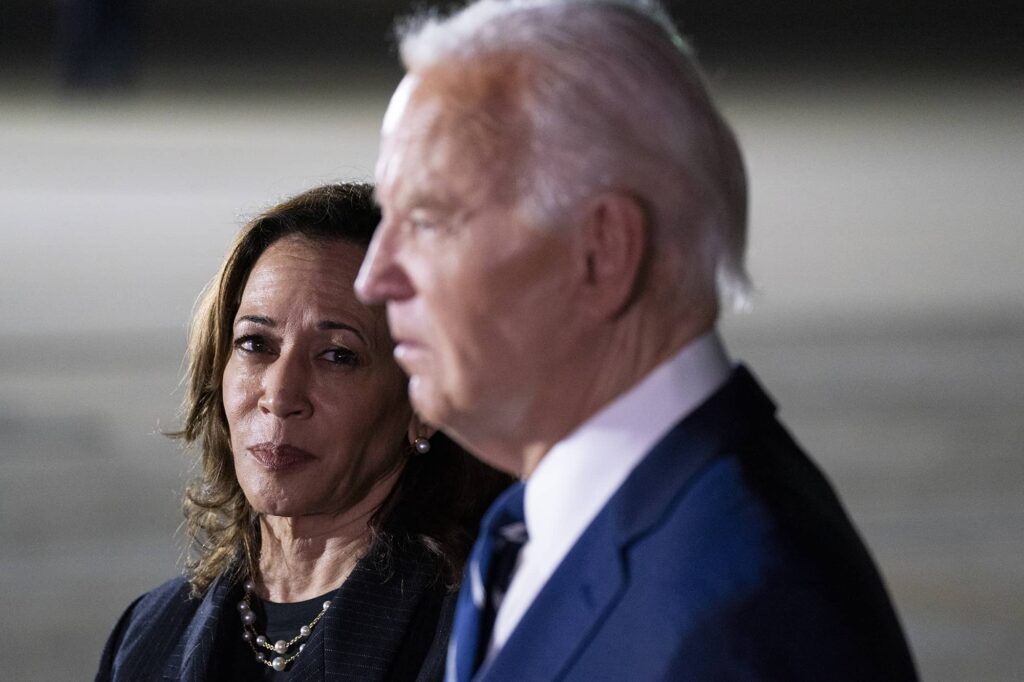How will Kamala Harris conduct foreign policy if she becomes president in January 2025? Would she hew to traditional Democratic Party stands on dealing with authoritarian regimes, climate change and foreign alliances? Or will she veer off in unpredictable directions?
One obvious place to try and answer this question might be to explore Harris’ own recent foreign policy stands. In a speech at the 2023 Munich Security Conference, she denounced Putin’s war in Ukraine as “an utter failure for Russia” but beyond that has not often addressed the topic. Most recently, she helped guide the talks with Russia to arrange the prisoner swap that took place in late July. Otherwise, Harris has said and done little in the arena of foreign policy.
Perhaps this reticence about foreign affairs is not surprising. Much of her political career, after all, has been devoted to domestic issues, and in the 2024 campaign, Harris, who suddenly became the Democratic nominee after Biden stepped down, is playing up her credentials as a former California prosecutor who can successfully target Trump.
Nevertheless, Harris does not possess a long track record on foreign affairs – in contrast to the backgrounds of many other vice presidents. Richard M. Nixon, vice president under Dwight D. Eisenhower, had served in the Pacific during World War II. A firm internationalist, he was a member of the congressional Herter committee in 1947, which traveled to war-torn Europe and laid the groundwork for the passage of the Marshall Plan. George H.W. Bush, Ronald Reagan’s vice president, had been ambassador to China and head of the CIA. Bill Clinton’s vice president, Al Gore, had served in Vietnam. As a congressman and senator, Gore was a leading voice on arms control, technological and environmental issues. He co-chaired the Gore-Chernomyrdin Commission, which sought to promote defense conversion, space cooperation and business development between Russia and America. During the George W. Bush administration, Vice President Dick Cheney exercised a leading role, particularly when it came to making the case for the 2003 Iraq War. And Joe Biden, vice president under Barack Obama, had served as head of the Senate Foreign Relations committee and was given the lead on foreign policy issues like Ukraine.
If Harris’ scanty record doesn’t provide much insight into her future foreign policy, perhaps the Biden administration’s does. According to Paul Glastris, a former speechwriter for Bill Clinton, Harris is likely to build on it. “Having spent four years under the tutelage of an accomplished foreign policy president,” Glastris says, “I suspect Harris will largely stick with the traditionalist, alliance-focused national security strategy of Joe Biden, and with luck she’ll also continue and even build on Biden’s much more daring and innovative breaks with neoliberal trade and international economic policies.” Similarly, Politico has reported: “In most areas, Harris would likely continue many of President Joe Biden’s foreign policy objectives.” It’s worth looking at Biden’s successes and setbacks, then, to try and discern what lessons Harris herself might draw from them.
One of Joe Biden’s early moves after he became president in January 2021 was to visit the State Department, where he declared that “diplomacy is back at the center of our foreign policy.” He declared that his ambition was to revive the democratic alliances that formed the backbone of American prosperity and power and had recently been allowed to atrophy. Biden noted that it was both moral and strategic to strengthen those alliances rather than the two being at odds. “When we strengthen our alliances,” he said, “we amplify our power as well as our ability to disrupt threats before they can reach our shores.”
As president, Biden has pursued a foreign policy vision that was diametrically opposed to his predecessor Donald J. Trump’s “America First” approach. Trump viewed alliances with fellow democracies in Europe and Asia with a measure of skepticism, disparaged free trade and sought to establish constructive relationships based on mutual interests with strong, if not dictatorial, regimes, ranging from Russia to North Korea. Trump’s views belong to an older tradition in the GOP, as I sought to show in my new book America Last: The Right’s Century-Long Romance with Foreign Dictators.
Biden, too, hewed to a longstanding tradition, but one that was based on the liberal realism adopted by the Truman administration after World War II. It holds that an alliance of democracies is mutually beneficial, that assisting weak countries is often in the American national interest and that prudent statecraft can also encompass moral considerations.
Biden’s greatest blunder came when he did not seek to act in tandem with America’s allies but unilaterally withdrew from Afghanistan. In implementing the plan that Trump had negotiated with the Taliban, and ignoring that plan’s preconditions for withdrawal, Biden took for granted the professions of the national security establishment that it would be a smooth and seamless exit. The reverse occurred. The American-backed government in Kabul decamped, surrendering Kabul almost without firing a shot. The chaotic footage undermined the image of competence that Biden had hitherto enjoyed.
The withdrawal may have created the impression abroad, particularly in Russia, that America was not willing to fight for its allies. Senate minority leader Mitch McConnell observed, ““I think the precipitous withdrawal from Afghanistan in August was a signal, to Putin and maybe to Chinese President Xi as well, that America was in retreat, that America could not be depended upon, and was an invitation to the autocrats of the world that maybe this was a good time to make a move.”

After the Afghan disaster, Biden had a chance to redeem himself abroad. One of Biden’s most notable achievements has been his bolstering of American ties with NATO and support for Ukraine. In 2021, the Biden administration launched a full-court press to persuade Russia not to invade Ukraine by releasing US intelligence information that Russia was indeed about to initiate a mass invasion of Ukraine. Putin dismissed this assessment as did Ukrainian president Volodymyr Zelensky. Numerous European leaders remained skeptical. But Biden’s stance was vindicated when Russia launched its assault on February 24 and it helped him to garner international support for the beleaguered country, amounting to over $200 billion in weapons and humanitarian aid. Biden was also able to win passage of $61 billion from Congress after a lengthy delay in 2024. At the 75th NATO summit in Washington he pledged five new air defense systems for Kyiv. Far from being able to conquer Ukraine, Putin has been stymied.
At the same time, Biden has overseen the further expansion of NATO. He overcame the objections of Turkey to include Sweden and Finland as members. The two Nordic countries enhance NATO’s defensive might. Finland has a conscript military with a reserve force of 900,000 and Sweden, 57,000. NATO now possesses increased naval and air power near the Russian enclave of Kaliningrad in the Baltic sea. In short, the addition of Finland and Sweden is another sign of how Putin’s war in Ukraine, coupled with his threats against the West, have boomeranged against him, creating the very NATO enlargement that he professed to fear and oppose.
When it comes to China, Biden has also laid a strong foundation for Harris. Biden has maintained a number of the tariffs that Trump imposed on Beijing, while restricting the salve of advanced microchips to it. Biden has also imposed selective tariffs on China, including on steel and aluminum, semiconductors, electric vehicles, solar cells and batteries. He has pressured China to refrain from resupplying Russia with weapons for the Ukraine war and impeded its export of chemicals that are employed for the opioid fentanyl. To firm up America’s presence in the region, Biden also established the Indo-Pacific Economic Framework, which is supposed to serve as a surrogate for American withdrawal from the Trans-Pacific Partnership.
Above all, Biden strengthened defense partnerships with the Philippines, South Korea, Japan and Australia. He also enhanced the trilateral relationship with South Korea and Japan, including a formal commitment to consult jointly about a security threat. While it doesn’t reach the collective defense standard of NATO’s Article V, it does represent a significant change in the often tense relations between South Korea and Japan.
Then there is the Middle East. Biden initially sought to isolate Saudi Arabia, but was forced to eat humble pie when he visited it in July 2022 and exchanged a fist bump with Crown Prince Mohammed bin Salman. Since then, rumors of a bilateral agreement with Saudi Arabia have been percolating, though the current hostilities in the Middle East have likely disrupted it.

The administration was caught flatfooted by October 7. “Although the Middle East remains beset with perennial challenges,” wrote national security adviser Jake Sullivan in Foreign Affairs on the eve of the Hamas attack on Israel, “the region is quieter than it has been for decades.” Biden has periodically expressed exasperation with Israeli Prime Minister Benjamin Netanyahu while sending a steady flow of munitions.
Is this the one area where Harris might break with Biden policy? I spoke with Curt Mills, the editor of The American Conservative, who points to the influence that Philip H. Gordon, currently on Vice President Harris’s staff, might exercise as a potential national security adviser. Gordon is the author of Losing the Long Game: the False Promise of Regime Change in the Middle East. According to Mills, “On the one hand her consigliere Phil Gordon would be an arch advocate of restraint if he were empowered. If Harris hits considerable headwinds as a neophyte president, then the chance for the brass to run her administration is far greater than it would have been under Biden who had a clear record of flouting the Pentagon.” By contrast, writing in the Financial Times, Anne-Marie Slaughter, chief executive of the New America Foundation, suggested that “efforts to find space between Harris and President Joe Biden, most notably on Israel/Gaza, yield differences of tone rather than substance.” On the one hand, Harris has declared “I will not be silent” about Gaza; on the other she has stated that she “stands with” the families of the Israeli hostages.
Harris may be a work in progress when it comes to foreign policy, but her public statements do suggest that she has already mastered the art of diplomatic ambiguity. As president, it could serve her well.

